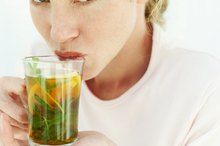What does fact checked mean?
At Healthfully, we strive to deliver objective content that is accurate and up-to-date. Our team periodically reviews articles in order to ensure content quality. The sources cited below consist of evidence from peer-reviewed journals, prominent medical organizations, academic associations, and government data.
- Mayo Clinic: High-protein diets: Are they safe?
- MedlinePlus: Nutrition and Athletic Performance
- American Heart Association: High-Protein Diets
The information contained on this site is for informational purposes only, and should not be used as a substitute for the advice of a professional health care provider. Please check with the appropriate physician regarding health questions and concerns. Although we strive to deliver accurate and up-to-date information, no guarantee to that effect is made.
High-Protein Diet & Sweating
Protein is necessary for bodily functions such as growth and tissue repair. A diet high in protein is often used to achieve rapid weight loss and may be used among athletes to improve performance. A high-protein diet involves side effects, including sweating, that can contribute to potential health dangers. Consult your doctor before beginning any new diet or exercise program.
Sources
A high-protein diet includes foods rich in protein while limiting your intake of carbohydrates like cereals, grains, vegetables and fruits. Top sources of protein include fish, poultry, red meat and dairy products.
Water Loss
Why Do I Feel Light Headed When I Drink Water?
Learn More
According to Vanderbilt University, your body excretes water to dispose of urea, a substance formed in protein breakdown. If you consume high amounts of protein, your body will excrete more water than usual, which can result in sweating and excessive urination.
High-Protein Diets and Athletes
MedlinePlus, the online medical encyclopedia of the National Institutes of Health, explains that some people falsely believe that athletes need to consume a high-protein diet for muscle growth. Athletes already sweat during performance 2. In fact, MedlinePlus reports that the amount of sweat lost during athletic performance can exceed several liters in one hour 2. Excessive water loss that results from a high-protein diet can be particularly dangerous and lead to dehydration for an athlete who is already sweating.
Other Dangers
How Many Liters of Water Should You Drink?
Learn More
In addition to sweating and water loss, a high-protein diet prevents other potential dangers. A high-protein diet typically consists of a lot of red meat and full-fat dairy products, which can increase your risk of heart disease, dietitian Katherine Zeratsky writes for the Mayo Clinic's website 1. A high-protein diet can also lead to nutritional deficiencies and place you at higher risk for osteoporosis and kidney and liver problems.
- In addition to sweating and water loss, a high-protein diet prevents other potential dangers.
- A high-protein diet can also lead to nutritional deficiencies and place you at higher risk for osteoporosis and kidney and liver problems.
Hydrating
If your doctor advises you to go on a high-protein diet, you can reduce the side effect of sweating by avoiding caffeine, a diuretic that promotes fluid loss. If you are going to be exercising or participating in athletics, be sure to hydrate before, during and after your exercise.
Related Articles
References
- Mayo Clinic: High-protein diets: Are they safe?
- MedlinePlus: Nutrition and Athletic Performance
- American Heart Association: High-Protein Diets
- Josse AR, Atkinson SA, Tarnopolsky MA, Phillips SM. Increased consumption of dairy foods and protein during diet- and exercise-induced weight loss promotes fat mass loss and lean mass gain in overweight and obese premenopausal women. J Nutr. 2011;141(9):1626-34. doi:10.3945/jn.111.141028
- Carreiro AL, Dhillon J, Gordon S, et al. The macronutrients, appetite, and energy intake. Annu Rev Nutr. 2016;36:73–103. doi:10.1146/annurev-nutr-121415-112624
- Ganesan K, Habboush Y, Sultan S. Intermittent fasting: The choice for a healthier lifestyle. Cureus. 2018;10(7):e2947. doi:10.7759/cureus.2947
- Pasiakos SM. Metabolic advantages of higher protein diets and benefits of dairy foods on weight management, glycemic regulation, and bone. J Food Sci. 2015;80 Suppl 1:A2-7. doi: 10.1111/1750-3841.12804
- Delimaris I. Adverse effects associated with protein intake above the recommended dietary allowance for adults. ISRN Nutr. 2013;2013:126929. doi:10.5402/2013/126929
- Bouvard V, Loomis D, Guyton KZ, et al. Carcinogenicity of consumption of red and processed meat. Lancet Oncol. 2015;16(16):1599-1600. doi:10.1016/S1470-2045(15)00444-1
- U.S. Department of Health, U.S. Department of Agriculture. Appendix 7. Nutritional Goals for Age-Sex Groups Based on Dietary Reference Intakes and Dietary Guidelines Recommendations - 2015-2020 Dietary Guidelines.
- Rodriguez NR, Dimarco NM, Langley S. Position of the American Dietetic Association, Dietitians of Canada, and the American College of Sports Medicine: Nutrition and athletic performance. J Am Diet Assoc. 2009;109(3):509-27. doi:10.1016/j.jada.2009.01.005
- Bray GA, Smith SR, de Jonge L, et al. Effect of dietary protein content on weight gain, energy expenditure, and body composition during overeating: a randomized controlled trial. JAMA. 2012;307(1):47-55. doi: 10.1001/jama.2011.1918. Erratum in: JAMA. 2012;307(10):1028.
- Centers for Disease Control and Prevention. Nutrition for Everyone: Protein.
- de Souza RJ, Bray GA, Carey VJ, et al. Effects of 4 weight-loss diets differing in fat, protein, and carbohydrate on fat mass, lean mass, visceral adipose tissue, and hepatic fat: results from the POUNDS LOST trial. Am J Clin Nutr. 2012;95(3):614-25. doi: 10.3945/ajcn.111.026328.
- Fox EA, McDaniel JL, Breitbach AP, Weiss EP. Perceived protein needs and measured protein intake in collegiate male athletes: an observational study. J Int Soc Sports Nutr. 2011;8:9. doi: 10.1186/1550-2783-8-9.
- Phillips SM, Zemel MB. Effect of protein, dairy components and energy balance in optimizing body composition. Nestle Nutr Inst Workshop Ser. 2011;69:97-108; discussion 108-13. doi: 10.1159/000329288.
- Te Morenga LA, Levers MT, Williams SM, et al. Comparison of high protein and high fiber weight-loss diets in women with risk factors for the metabolic syndrome: a randomized trial. Nutr J. 2011;10:40. doi: 10.1186/1475-2891-10-40.
Writer Bio
Rose Welton is a journalism major and a freelance writer. Her education is focused on nutrition and early childhood studies, making her an expert when it comes to writing about health and children's growth and development. She has written numerous articles and blog posts on various topics for online publications and has also worked on an Internet news team.









